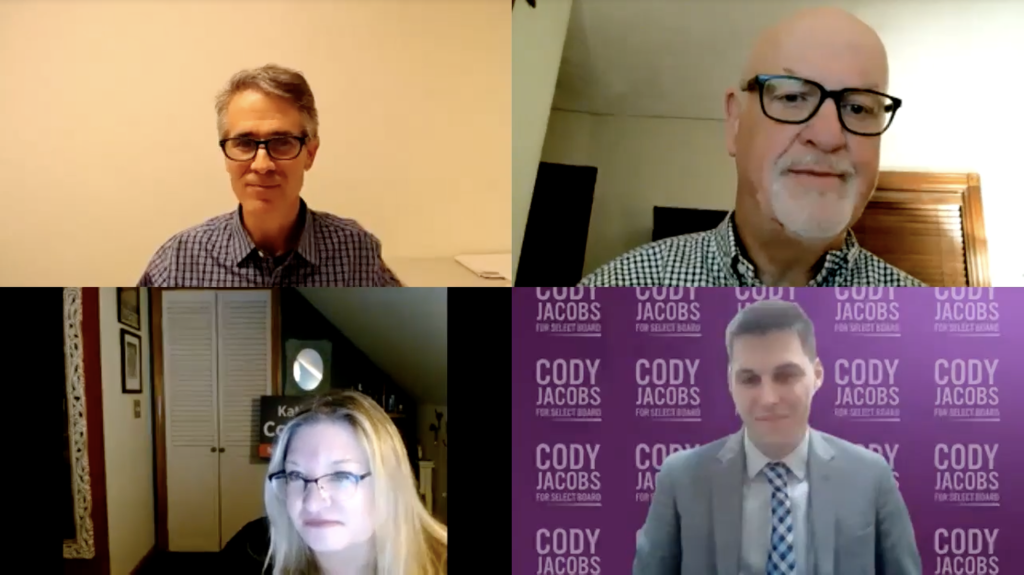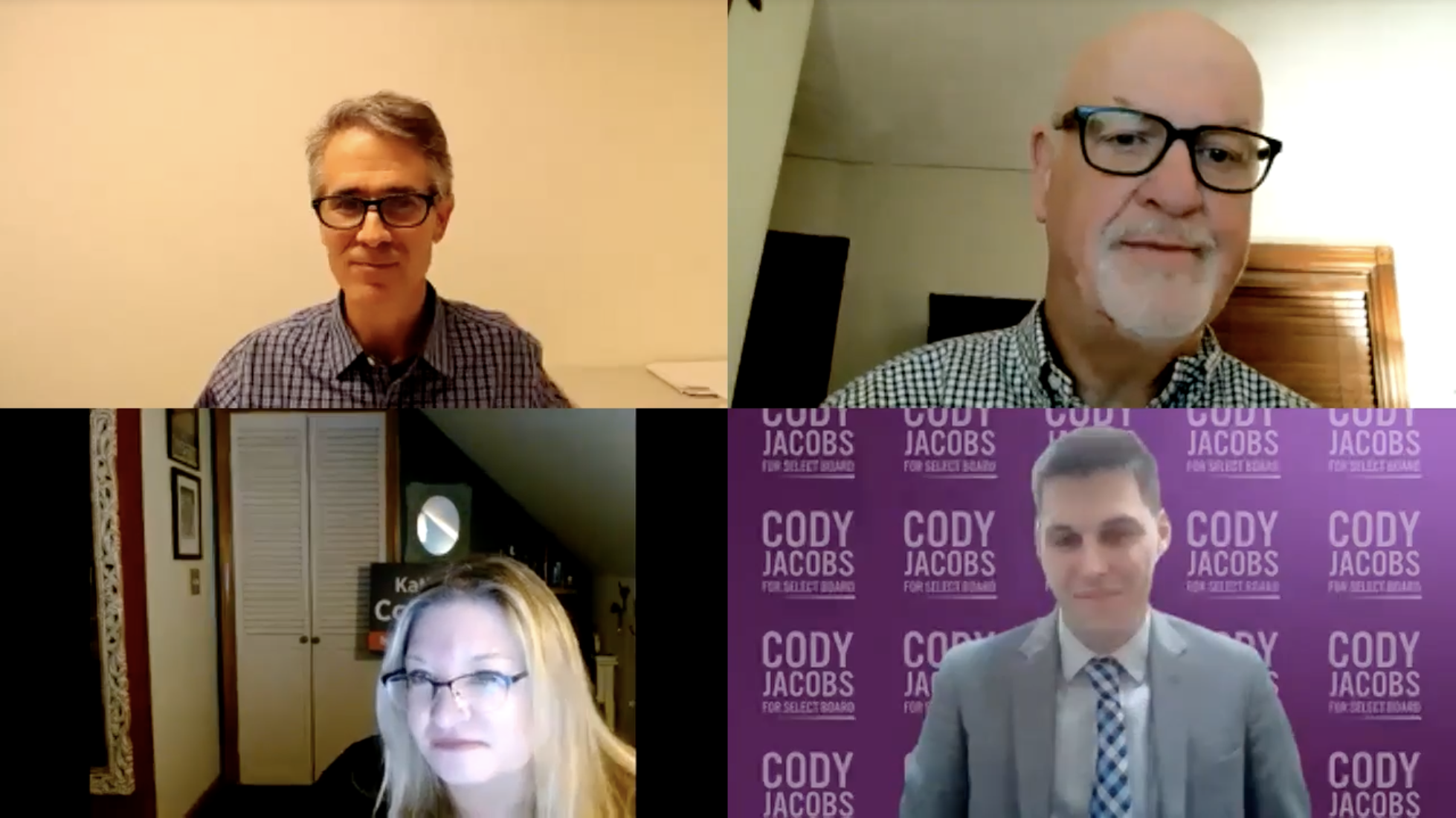By Ashlyn Kelly
***

NATICK – Volunteer group EcoNatick held a virtual forum on March 22 for the Natick Select Board candidates to talk about environmental issues, such as electrification of buildings, the South Natick Dam, and joining the Community Preservation Act.
The forum was moderated by Jay Turner, an Environmental Studies Professor at Wellesley College and resident of Natick.
Natick’s 2022 Annual Town Election is scheduled for March 29.
There are three candidates for two seat on the 5-member Natick Select Board.
Current Select Board members Susan Salamoff and Richard Jennett are not seeking re-election.
The three candidates for Select Board are Kathryn Coughlin, Bruce Evans, and Cody Jacobs. All were present at the EcoNatick forum.
In Coughlin’s opening statement, she said would be participating in EcoNatick’s Earth Day by hosting a forum “in which I will share my experiences over the past several years eliminating single-use plastic from our household and offering suggestions on how others can do the same with regard to Natick’s net-zero goals.”
In Evan’s opening statement, he said he has been committed to the environment for more than 30 years, including being a volunteer for his previous town’s recycling program. “Today I’m focused on policy changes and practices and I’m committed to making native a community where environmental sustainability is a priority.”
In Jacobs’ opening statement, he said, “Climate change is a quintessential global problem. But as Natick has already shown, there’s a lot we can do locally on this issue and we’ve already made a lot of progress. I would like to continue and expand on that progress.”
The first three questions were prepared by EcoNatick and attendees could submit questions for later in the forum.
[broadstreet zone=”58610″]
The first question Turner asked the candidates was how the Select Board could best support accelerating the “electrification of residential homes and commercial buildings?”
According to Turner, buildings are the largest source of greenhouse gases in Natick, and transitioning to being fully electric is “expensive. [It] require[s] advanced planning and making [it] will require support from the town and beyond.”
Evans said, “Part of it is education and outreach.”
He recommended hiring the Chief Infomation Officer to help provide information to residents.
He added the town could offer “proof points” by replacing the boiler at the Morse Institute Library and “showcasing a commercial-sized heat pump there.
“I want to accelerate as quickly as possible to 100% renewable energy electrification – the targets 2030,” said Evans. “I’d like to see an increasing percentage at a faster rate while preserving the cost benefits to the residents.”
Jacobs said, “Electrification is critical, and I think it’s probably the biggest challenge in getting to net-zero because it involves so much cost and there are so many buildings involved.”
He added that Natick has begun the process of “getting people more transparent pricing information, information about reputable vendors … that I think are going to help” and he would like this expanded to other municipalities “because the more that joined together, the more that we’ll be able to pool our resources and negotiate steeper discounts for consumers, which is going to be the key to making it economically feasible.”
Coughlin said that Evans and Jacobs covered most of what she would say but added, “I’d like to be thinking about the rapid acceleration or rapidly accelerating the electrical electrification of residential homes with an equity focus.”
She said one way that could be achieved would be to “develop a voucher program for lower-income families so that they can participate and make up the difference in what would have been just the standard opt-in green rate.”
[broadstreet zone=”53130″]
Turner asked the candidates a follow-up question about how the Town would get to 100% green energy by 2030.
Evans said in an Excel spreadsheet he put together, he calculated the amount the “the less than 100% Green would have to increase. … If you did a 30 cent increase per year, that would get you there within about five, six years.
Coughlin said, in her chart, “we were looking at, I’m going to say roughly four and a half cents to five cents per year, matched by what the state matched to get to 2030 for residential properties.
Jacobs’ said he spoke with the Director Of Sustainability for the Town of Natick, Jillian Wilson-Martin, and “the gap is because of the state’s level gradually increasing at the same time and so if you incorporate the state’s level increases, and the town 3%, we would get there by 2030 if we just kept on 3% a year. …But I definitely support trying to push faster because even 2030 I think, you know, it’s pretty far off when it is, as I mentioned, climate emergency.”
The third question Turner asked the candidates was how they would approach the decision as to what to do with the damn in South Natick on the Charles River.
According to Turner, the dam needs “major investments in the upcoming years to ensure its safety.” There were two options presented. The first is to restore the dam, which would require “substantial” landscaping changes. The second is to remove the spillway and “restore the flow of the Charles River.”
Jacobs said that the topic is “rife with tradeoffs” and needs “expertise” that he does not have so he is “glad” to have a committee doing “very thorough work” on the topic.
He added he would wait to hear their full report but based on what he had read of the committee’s work, he would “lean” toward “restoration of the original flow of the river.”
[broadstreet zone=”59983″]
Coughlin said she would also want to wait to have the final recommendation from the committee, she is “leaning towards removing the spillway” but has been examining the issue in four different ways.
The first was that removing the spillway would result “in a less sedimented river and provide less favorable conditions for blue algae.” The second, she said, was that she is “keenly aware” of how dams have been used to reduce food access for indigenous peoples “even though our current residents who are indigenous populations do not rely on the Charles River for food.”
She also thought about how landscaping changes due to repairing the dam would “surrounding area far less appealing because all the trees would be removed.” Lastly, she said the cost of repairing and maintaining the dam is expensive, and “from a liability perspective, we’re looking at climate change where we’re looking at maybe 40-50 feet rises in water level rises during terrible storms.”
Evans said, “Removing the spillway and restoring the river to its natural condition is viewed as the best approach, so I’m leaning towards that.”
He added, “If credible contrary information is presented that yields a better option, I’m open to considering it.”
The fourth question Turner asked the candidates was how they would vote on joining the Community Preservation Act and what their priorities would be?
Coughlin said, “Natick residents had been paying fees – as they buy and sell real estate – to the state and getting nothing for it. … If we had accepted or adopted the CPA at its inception, we would have had $36 million with which to spend on open space parks, affordable housing and historic preservation.”
She added, “I’m very much in favor of it.”
Evans said he has “some concerns” due to the Town facing an operational override and a potential debt exclusion, as well as the “potential burden on tired staff by the Community Preservation Committee that would be created by this.”
He added his priorities would be “open space acquisition and affordable housing.”
Jacobs said he would vote in favor of adopting the Community Preservation Act. “I think it’s just a smart financial decision.
“Affordable housing – for me – would probably be at the at or near the top” of his priorities list, he added.
Turner asked the candidates a follow-up question about how they would balance open spaces and affordable housing because “there have been times when we’ve had affordable housing projects that have actually been proposed for existing open space.”
Coughlin said she would like to see more affordable housing in areas that are walkable to public transportation and shopping.
Evans said he would like to invest in more multifamily housing, one-level affordable senior housing, and “people who are looking to downsize from the home they’ve lived in their entire life can get a place maybe downtown and easily walkable to places they’d like to go.”
Jacobs said, “We should also be looking at projects that combine a little bit of those” such as having a “dense development and then like a pocket park or something like that.”

Another issue raised by attendees was how Natick’s Office of Sustainability is staffed by one part-time director.
Evans said, “We really should get her the assistance that she needs.”
Jacobs said, “I do think we need to invest more in that department.”
Coughlin said, “That position has paid for itself over and over, not just the salary, but the benefits to the town, so I would argue strongly that yes, she definitely needs at least another [part]-time person.”
One attendees to the forum asked the candidates would they “support banning chemical herbicides on all public lands in Natick?”
Evans said, “There is too much fertilizer runoff. … Too many people overapply fertilizer and think more is better.
“The town uses state-authorized herbicides, and I agree that it’s the kind of thing that – herbicides – you always want to use the least possible amount that gets the job completed,” he added.
Coughlin said, “In the absence of more information, I’m definitely in favor of it.”
She added that she uses a combination of industrial-strength white vinegar and boiling water, “but I don’t know how scalable what I do in my home is on a town-wide basis.”
Jacobs said, “My answer is yes, I would favor doing that. I do think it’s important … for the town to set an example on some of these issues.”
[broadstreet zone=”59982″]
The last question asked during the forum was “Would you support electric school buses and Natick, and [what are] your thoughts on how soon town vehicles can be electrified?”
Coughlin said, “As vehicles come up to be replaced, absolutely, I think we should be moving to EV where it’s feasible.”
She explained the fire department purchased an SUV which was not electric because there was not an electric vehicle available that could carry the personnel and equipment needed to respond to calls.
She said she would encourage the School Committee to look into electrical buses, adding “The school committee negotiates their buses through contracts and right now they’ve recently renewed their contract and there are not electrical buses in fleets. … We don’t have as a select board really any authority over the school committee.”
Jacobs said, “The electrified buses like I do think … the fact that it’s via contracting is an opportunity because you can use that leverage … but it’s within the purview of the school committee, so that’s ultimately up to them.
“Some of the new police vehicles we’ve been purchasing have been hybrid vehicles, and I think that’s a good step in the right direction, but I’d like to see us move towards more totally electric vehicles,” he added.
Evans said, “The school committee owns the contract with the school buses. There are two principal suppliers in this area and I think this is another area where we need help from the state … [to] encourage these vendors to pilot those types of systems or those types of buses.”
He added, “I kept asking that same question about hybrids and electrics and the answer has been consistent with what others have said – there are certain things that lend themselves to going first hybrid and then electric.”

Polls will be open until 8 p.m. on Tuesday, March 29.
- Precinct 1: Kennedy Middle School (165 Mill St.)
- Precinct 2: Kennedy Middle School (165 Mill St.)
- Precinct 3: Kennedy Middle School (165 Mill St.)
- Precinct 4: Wilson Middle School (22 Rutledge Rd.)
- Precinct 5: Wilson Middle School (22 Rutledge Rd.)
- Precint 6: Lilja Elementary School (41 Bacon St.)
- Precinct 7: Community-Senior Center (117 East Central St.)
- Precinct 8: Morse Institute LIbrary (14 East Central St.)
- Precinct 9: Community-Senior Center (117 East Central St.)
- Precinct 10: Community-Senior Center (117 East Central St.)
***
Ashlyn Kelly is a Spring 2022 SOURCE intern. She is a is a senior communication arts major with minors in political science and journalism at Framingham State University. When she is not writing an article, you can usually find her in a theatre.



